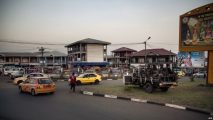Privacy Overview
This website uses cookies so that we can provide you with the best user experience possible. Cookie information is stored in your browser and performs functions such as recognising you when you return to our website and helping our team to understand which sections of the website you find most interesting and useful.


















24, January 2025
A new unrealistic Biya mandate would constitute a mistake 0
Several Cameroonian bishops have taken sides against the possibility of a new candidacy by Paul Biya in the presidential election to be held in October 2025. After 42 years of unchallenged rule, part of the Church in Cameroon wants to turn the page in a country that appears fragmented.
At 91 years old, the “sphinx” is the oldest elected leader in office and the second head of state in the world still alive in terms of longevity in power.
This adds fuel to the fire for Africans who made the ironic statement that Africa is a “young continent led by old people.” To top it all off, add to that the autocratic management of Paul Biya, which has hardened after his last highly contested election in 2018, repressing any dissenting political opinion in the country.
The worrying state of health of the current head of state might have been a intimation that the latter would finally hand over the reins. Alas, during his New Year’s wishes for 2025, Paul Biya kept his political future vague. “I have heard your calls and your encouragement, and I remain devoted to serving our beloved nation,” he declared in response to the cleverly orchestrated messages from his fervent supporters who are asking him to run for office one last time in 2025.
A new “unrealistic” mandate would constitute a “mistake” according to the terms used by the Archbishop of Douala on RFI. “People are worried, we need a peaceful transition,” added Bishop Samuel Kleda. Words little appreciated by the government.
While one of the opposition representatives – Jean-Michel Nintcheu, president of the Front for Change – praised the archbishop and called on Paul Biya to take “a well-deserved retirement,” the Minister of Labor and Social Affairs accused the prelate of having “exceeded his clerical responsibilities.”
“He sometimes feels obliged to take political positions, without analyzing all the consequences. He has therefore taken his position as a citizen, and those among his flock who want to follow him will follow him,” deplored Grégoire Owona.
But Bishop Kleda’s episcopal remarks are far from being isolated within the Cameroonian Catholic Church: on January 1, Bishop Barthélemy Yaouda Hourgo, Bishop of Yagoua (North of the country) denounced, miter on head, the possible candidacy of Paul Biya. “We are not going to put up with any more, we have suffered enough as it is,” exploded the prelate in a message that quickly went viral on social networks.
“The most terrible suffering is that Cameroonians are forbidden to express their suffering. . . referring to threats by the Cameroon Minister of Territorial Administration who describes the state as a ‘blender’ that will crush anyone voicing contrary opinions to that of the government. Who are they going to govern when they have crushed all the Cameroonians? Cameroonians are asked to avoid hate speech, but from above we receive words of violence,” stated the Bishop of Yagoua.
With more restraint, Jean Mbarga, Archbishop of Yaoundé, the country’s capital, called on the State “to do everything to ensure that the voice of Cameroonians is heard,” discreetly alluding to the political transition for which a large part of the citizens are calling.
According to Thomas Atenga, professor of communication at the University of Douala interviewed by the BBC, the position of some members of the Cameroon Catholic clergy would reveal the fragmentation between “the real country and its daily sufferings, which the bishops claim to be close to, and the political class that seems disconnected from the reality experienced by Cameroonians.”
Even if the Catholic hierarchy is not unanimous in its rejection of the “sphinx,” according to the professor, the Church – an institution of importance in this African country – “has no other choice but to aspire to greater freedom. Because after 42 years in power, it is high time that Cameroonians experienced other forms of hope, of government, which allow them to think that, the world is different from the one they have known for these years.”
Source: RFI